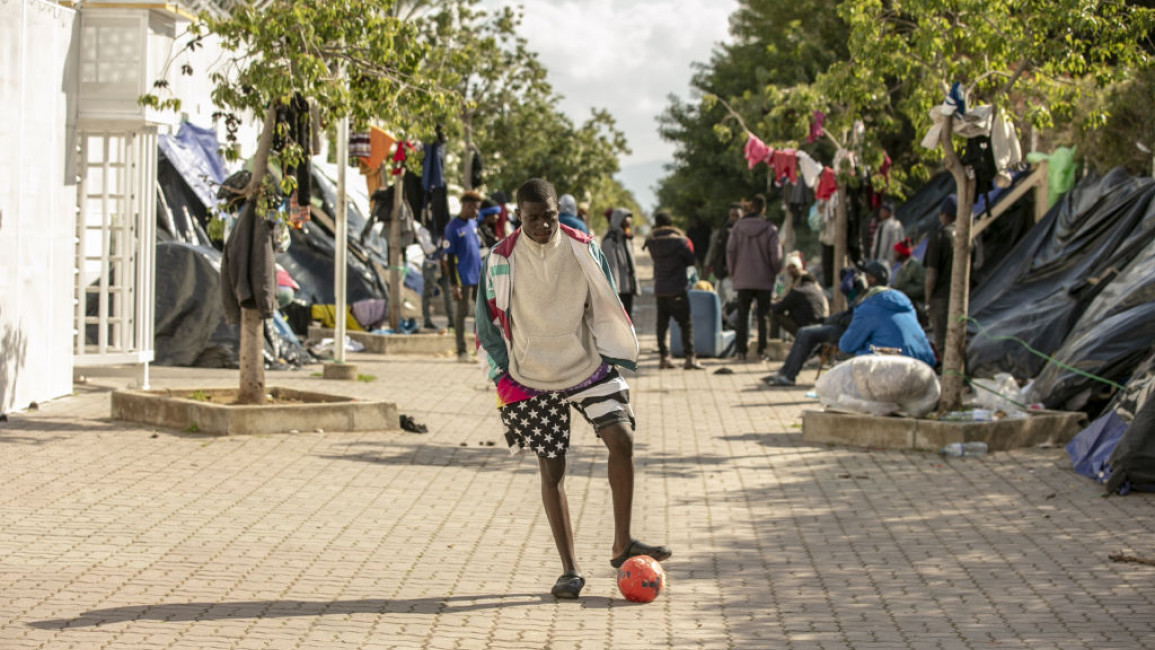In Tunisia's Sfax, migrants have to 'rent' shade to avoid heat wave
As Tunisia witnesses an unprecedented heatwave of an average of 50 degrees Celsius, "criminal gangs" charge homeless black migrants to shelter beneath the olive trees' shade, say migrants.
"In Sfax, many of us are homeless. We only have trees and parks to avoid a heat stroke," Oussama, a Nigerian migrant living in Sfax, told The New Arab.
"Now, some people ask us for five dinars (US$1.6) for an hour so we can sit under trees. It's ridiculous," he added.
The temperature in Sfax reached 45 degrees Celsius on Tuesday. In Tunis, it reached 50 degrees Celsius. July's average is 33C degrees.
For many Tunisians, the current heatwave is a worrying anomaly. But for the Black migrants and refugees living rough in the cities and desert, it is potentially deadly.
At the start of July, clashes erupted between the residents of Sfax city and hundreds of Sub-Sharian migrants living in the In central-eastern city - a key departure point for many migrant boat crossings to Italy.
Amid the tensions, hundreds of black migrants were kicked out of their rents. Others escaped their places, fearing mobs, angry residents' attacks and police arrests.
"Unfortunately, amid the rising racism wave in the country, many criminal rings are taking advantage of the situation of the migrants," Romdhane Ben Amor, a member of the Forum for Economic and Social Rights (FTDES), said to TNA.
The North African country witnessed a rising wave of racism after President Kais Saied claimed, in February, that Sub-Saharan migration to Tunisian is "organised crime" that threatens to change the country's demographic makeup.
Today, beneath 50 degrees Celsius, homeless black migrants and refugees lay on the burning ground, saying they have no way out from Saied's inferno as death looms from everywhere.
Cold tap water runs hot, unprotected food spoils, the ground rarely cools,'‘ renting'’ shade costs a fortune and leaving to more excellent areas can risk their deportation to the Sahara borders, where at least six migrants died from hunger and the heat, say migrants.
Meanwhile, at least 15 migrants have been found dead off Tunisia's coast and on its border with Algeria this week, authorities said on Friday.
The deaths come as sub-Saharan Africans face increasing tensions in Tunisia, and more and more people seek to leave or transit through the country en route to Europe.
Oussama says sometimes he lurks next to the fancy cafés to enjoy a glimpse of the airconditioner's coolness when a customer opens a door or when the angry worker heads out of place to tell him to leave.
The twenty-four-year-old Nigerian spent a year en route to arrive in Tunisia, planning to leave on a boat to Europe as soon as possible. "It's hard [to leave for Europe] now after their deal with Europe. Even smugglers don't trust us [black migrants]", he said. "Now, I have no plan. I only want to survive".
Last week, the EU and Tunisia signed a memorandum of understanding for a "strategic and comprehensive partnership" on irregular migration and economic development, brushing over the migrants' crisis at the Tunisian borders.



